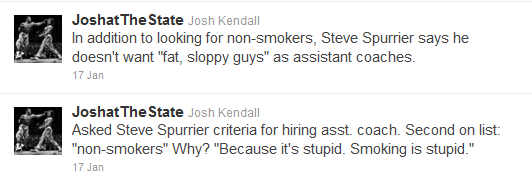Checking it Twice - Happy Tim Sackett Day
Happy Tim Sackett Day!
What the heck is Tim Sackett Day?
Let's take a step back and try and explain.
In the last couple of years, more or less tied to the growth and increasing importance of social networking, online reputation, and emerging consideration, (and attempts to quantify), digital influence; the Human Resources and Recruiting world has seen a plethora of published influence lists, rankings, and other measures of (variously), popularity, importance, influence, quality, and so on. Tim!!!
Tim!!!
While the relevance, accuracy, and importance of any of these kinds of lists can certainly be debated, to me, several enduring truths have emerged from their publication and the subsequent analysis, self-congratulation, hand-wringing, complaining exercises that invariably follow. And these truths are as follows:
1. When any new 'Top HR or Recruiting' list is published, there are only three possible reactions:
A. Hooray! I made the list!
B. How come I didn't make the list?!?
C. WTF!!!! How did (insert the name of the person you perceive to be slightly less popular/intelligent/influential/good looking here), make the list and I didn't?
2. For those list named to the newly published list, a round of (fake) congratulatory tweets, Facebook updates, re-tweets ensues. While these updates usually take the form of 'Congratulations Person X for making the list!!!', they can be safely interpreted as 'I am on this list too, and don't forget it pal.'
3. For anyone not included on the latest list, more of less equal parts of indifference, interest, and genuine enthusiasm for those lucky folks that were included. Actually, when I think about it, I take back the 'equal parts' bit. Most people, especially busy people with a lot of responsibility don't really notice these lists at all.
4. Last, and probably most importantly, no matter what the latest HR or Recruiting list attempts to measure or rate, chances are VERY likely that Tim Sackett will not be included.
So while Tim's exclusion from these lists has become an ongoing inside joke in the (pretty small), world of social media and HR, it also raises a few questions about these kinds of lists, what they represent, and if they matter. Since to me, Tim is really exactly the kind of HR and Recruiting pro that should be recognized on these kinds of lists, and the fact that he never seems to land on any of them, while incredibly amusing, is still kind of curious. Tim's a pro, and has been for a long time.
I think it was this kind of thinking that inspired Laurie Ruettimann to enlist a few of Tim's friends to create Tim Sackett Day. While we are paying tribute to Tim, while subsequently making fun of him, I think the larger point is that there are scores of smart, powerful, influential, and simply indispensible HR and Recruiting professionals out there that do not get the recognition they deserve. Maybe because they don't have time to read and re-share dozens of HR blogs every week, or they don't obsess over chiming in to every Twitter chat, or don't have that touch of narcissism to possess them to blog or heaven forbid, show up to speak at HR events.
They are just out there, every day, grinding away. Doing their part to keep the trains running, help their organizations, communities, and families. Just like our boy Timmy.
So while we congratulate Tim today, mainly for never having being recognized, we also recognize all of the great HR and Recruiting professionals today. For Tim is really all of you.
Only shorter.
Congrats Tim!
Note:
You can follow the fun today on Twitter - search for the hashtag #TimSackettDay
Also, Tim will be a guest on the DriveThruHR internet radio show today at 1:00PM ET - you can tune in at this link - DriveThruHR with Tim Sackett

 Steve
Steve



